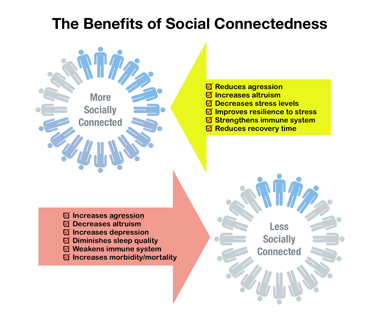The last few weeks have created a brand new category of buzz words into the public lexicon: “quarantine,” “self-isolation,” and “social distancing” to name a few. All of these are vital strategies to slow the spread of the coronavirus and prevent our health care facilities from becoming overwhelmed while we buy some time for testing, vaccines, and other resources.
Schools, restaurants, and theaters have been shuttered until further notice. Festivals, conferences, and sporting events have been canceled. Companies are telling employees not to come in to work. Churches are streaming services online. Nursing homes are restricting visitation for their residents.
Let me state up front that I’m in no way suggesting these measures aren’t necessary strategies to minimize human contact in an effort to keep people healthy. They are critical. However, I am suggesting that minimizing human contact doesn’t mean minimizing human connection. Challenging times such as these call for more human connection – not less.
There is a wealth of research over the last 50 years showing how human connection and sense of belonging builds resilience, counters stress, and improves physical, emotional and mental health – especially during difficult times. One study conducted at UCLA showed that "feeling connected" to others strengthens immunity, and reduces recovery time from illness or medical procedures.
Another study found that people who are socially isolated develop changes in their immune system, react more intensely to stressful events and suffer more extensively as a result of the stress. Other experts maintain that loneliness and social isolation are twice as harmful to physical and mental health as obesity, and the physiological consequences include cognitive decline, increased depression, diminished sleep quality, and increased morbidity and mortality.

Other studies show that feelings of connection don’t just make us feel good; they make us do good. Our level of social connectedness corresponds to pro-social behaviors.
Feeling connected reduces aggression and increases altruism while feeling excluded increases aggression and reduces altruism.Altruistic behaviors that grow out of challenging times enable people to feel a greater sense of purpose, meaning and healing within the context of community. In the aftermath of natural disasters such as hurricanes, earthquakes, and wildfires, we’ve witnessed the very best of us – kindness, generosity, and compassion among strangers bound only by humanity. Remember how united we felt after the after the terrorist attacks on 9/11?
A very simple explanation for all of these scientific findings is what Maslow identified as our third fundamental human need – right after basic physiology and personal safety. But psychological research suggests that social connectedness is what we need most. Even when our physical needs are met, belonging is essential to our existence as social creatures.
Social distancing doesn't mean social isolation, and limited human contact doesn’t mean limited human connection. We often hear how technology – specifically social media is destroying the way we interact, communicate, and connect with one another. Let’s use that technology to bring people together with a sense of inclusion, support, empathy, and love.
It is no secret that times of crisis can bring out the worst in people. We can choose to add to our growing anxiety by focusing on those motivated by greed or fear. Or, we can choose to look for opportunities to be a positive ripple in the universe, to help one another and build strong and enduring human relationships that will get us through this thing together.
Times like this are exactly when we need to be “together” the most. Share this with someone in your corner of the world!
A little more than a year ago, my friends Kevin Monroe and Mike Vicante were talking about putting #HumansFirst and making gratitude an intentional part of life. These constructs resonated with people so much that Kevin and Mike soon learned that people were so hungry for conversation, compassion, and connection, they needed to create a safe place for people to join together. It didn’t take long to make the HumansFirst Hangouts a reality. In these challenging and uncertain times, make a little time for yourself to connect with others from all over the world, share your thoughts, enjoy the smiles and laughter, or just listen for that kind word or uplifting thought that you might have been missing. Because we are better, together. I am not alone in this. You are not alone. We are not alone.
Open Zoom Links for HumansFirst Hangout calls Monday through Friday can be found at https://lnkd.in/ds6vcAY.
#coronavirus #socialconnection #bettertogether #socialdistancing








